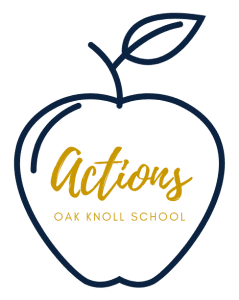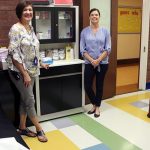Q&A: Lara Schaeffer, Upper School English Department Chair

English Department Chair Lara Schaeffer at the post office returning work and materials to her AP Literature class when we first switched to remote learning. Now, most English teachers collect, comment on, and return essays electronically, even when we are in-person.
Actions is a new editorial feature from Oak Knoll School of the Holy Child. Each week we will spotlight the dedicated faculty and staff across the PK-12 campus who make a difference in the lives of OKS students and the life of the school. This week, we feature:
Lara Schaeffer
Upper School English Department Chair
Q: As the chair of Oak Knoll’s Upper School English Department, can you talk a bit about our English Department and how our curriculum specifically prepares and challenges our high school students for college and beyond?
A: Our students engage with literature and writing in so many ways and on so many levels during every English class period at Oak Knoll. The teachers in the English Department lead students through texts that have many layers to them and thus provide a great range of challenge, allowing teachers to pivot within a lesson or build upon student interest so that the material is always fresh and engaging. By senior year, our students are universally capable in the realms of critical thinking, literary analysis, and writing in many forms. We get so many letters from our graduates, freshmen in college, who have helped their roommates with essays or have been singled out by professors for the strength of their work; some of these students did not consider themselves particularly strong writers while at Oak Knoll, but when they got out into the world they realized and were grateful for their writing capabilities!
Q: Can you talk about how reading influences and improves one’s ability to write? For each grade, what are the essential novels/writings that our students can expect to read?
A: When we read, while we might be aware of taking in content or plot, our brains are also absorbing elements like vocabulary, syntax, and style at the same time. The more a student reads, the larger her vocabulary grows, and the better she is able to, first, duplicate the proper ways to write, and eventually develop her own voice and writing style. Good writers tend to be active readers.
Some of our core texts at each grade level are: Ask Me No Questions by Marina Budhos and The Secret Life of Bees by Sue Monk Kidd in grade seven; Brown Girl Dreaming by Jacqueline Woodson and To Kill a Mockingbird by Harper Lee in grade eight; Barbara Kingsolver’s The Bean Trees and Homer’s Odyssey in the ninth grade; Jeannette Walls’ The Glass Castle and Shakespeare’s Macbeth in the tenth grade; F. Scott Fitzgerald’s The Great Gatsby and Nathaniel Hawthorne’s The Scarlet Letter in grade eleven; and Pride and Prejudice by Jane Austen and Purple Hibiscus by Chimamanda Ngozi Adichie in students’ senior year.
Q: Can you give us a few examples of how you are using real-world examples in your teachings and review of literature to make it fun and engaging?
A: After reading Sophocles’ Antigone and Twelve Angry Men by Reginald Rose, our English 10 class recently held a mock trial complete with all components of a court case. These two literary works center around justice, and the class activity opened students’ eyes to the challenges and frustrations when people on two opposite sides of an argument believe deeply in their position.
Prior to reading Toni Morrison’s Sula this past fall with my AP class, students researched and then shared with each other the history of New Orleans, the effects and aftermath of Hurricane Katrina, as well as the creation of city housing projects across America. They also uncovered the birth of jazz, blues, and rap music in America. The emotions and pain as well as laughter and life that permeate Sula’s community in Morrison’s novel are much easier for students to latch on to when they have already learned about the real versions of that pain and laughter and life. After the civil unrest of the summer of 2020, this unit held particular power.
Q: What has been your favorite project that you have engaged your students in and why?
A: When we first switched to remote teaching at the beginning of the pandemic, we were at the end of reading Homer’s Odyssey. Among a few options to cap off our study of the epic, students could choose to create a “personal odyssey” which shared some stylistic element with Homer’s original. No matter the time period, every adolescent’s story or odyssey is full of challenge, self-discovery and, hopefully, paths toward success or confidence; in 2020, however, the journey was more daunting and the end result far less unpredictable. The project led some students to create especially compelling pieces. I will always look back at that project as almost heralding in a new world order, and certainly a new way of growing up for our students.
Q: What will our students remember – unique to Oak Knoll – from our English program when they enter college and beyond?
A: Students will remember that we not only taught them to write, but we also guided them to finding their voice. Here, “All voices deserve to be heard and respected,” proclaimed Holy Child Founder Cornelia Connelly, and our English classrooms promote that virtue every day. I hope that students also remember lots of laughter and energetic exchanges from their classes in open and welcoming classroom environments, and an array of teachers who each are very different from each other, but who complement each other in a powerfully successful way.
Lara Schaeffer has been teaching at Oak Knoll for 16 years and is in her third year of serving as English Department Chair. Before Oak Knoll, Lara taught English at the Birch Wathen Lenox School in Manhattan. Lara lives in Springfield with her daughter Rose and her rescue dog Calvin. Lara loves walking all over town and nearby parks with Calvin as well as gardening and tending her houseplants, cooking, and doing jigsaw puzzles.







